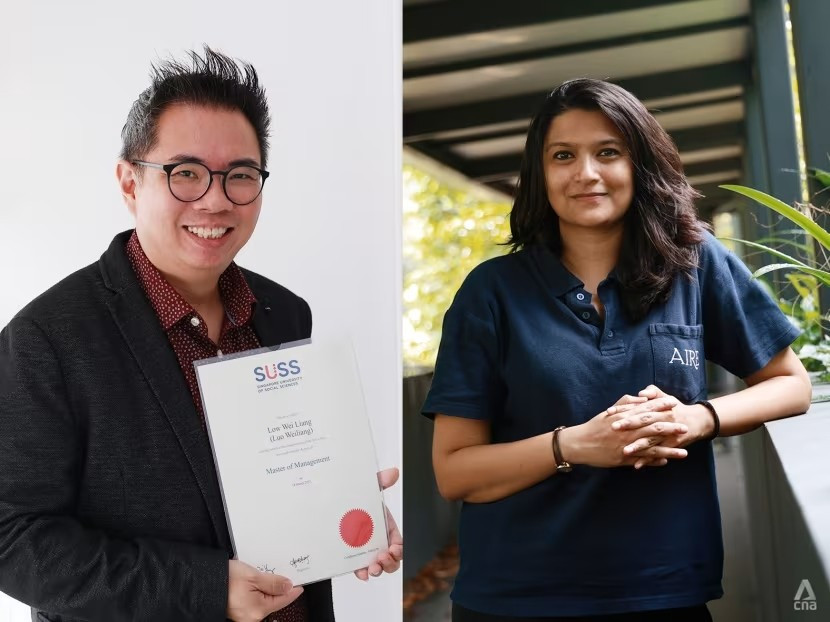Even with a degree, many people still struggle to find a stable job in an increasingly competitive and pragmatic labor market.
Changes in recruitment
Many people are beginning to ask: Does a master's degree really benefit your career? Experts say it depends on your specific study goals, career path, and expectations.
Once considered an important credential that opened the door to better job opportunities, higher salaries, or even career changes, a master's degree today no longer guarantees success as it once did.
In Singapore, the sluggish job market in recent years has left some recent master’s graduates saying they are not getting the edge they expected. In addition to high tuition fees, the opportunity cost of lost study time is also a concern for many.
For 31-year-old telecommunications engineer Noel Png, the decision to pursue a master's degree in mechanical engineering at the University of Strathclyde (UK) stemmed from a desire to redefine his career. After graduating with a degree in engineering from the National University of Singapore with a low GPA, Noel Png felt at a disadvantage in the domestic job market.
“I felt that if I wanted to compete, I needed to find a way to level the playing field. That’s when I started seriously considering doing a master’s degree abroad – something that would add value to my profile,” Noel Png said.
He quit his full-time job to pursue a master’s degree in the UK in early 2020. However, it was not an easy decision. At the time, many people advised Noel Png to be cautious, especially when Covid-19 was a global crisis. “People told me: ‘Don’t quit your job, it’s too risky.’ But I felt I was too safe. Something had to change,” Noel Png said.
After two years of studying and returning home, Noel Png began to realise that a master’s degree from a foreign university was no guarantee of a smooth re-entry into the Singapore job market. “When I returned, I thought that a master’s degree abroad would be more acceptable, but it actually depends on the industry. Many people in the human resources (HR) industry did not understand my degree.
Singapore tends to value prestigious universities more, not really knowing how to evaluate the quality of lesser-known schools. Every Singaporean is at the stage of settling down, planning to buy a house, but I was at the stage of studying full-time for two years without a job, losing two years of salary,” Noel Png said.
Asked if he regretted pursuing his master’s degree, Mr. Png replied: “Definitely. It’s just a financial issue. I probably could have done it online and cut back to working four days a week.”
Meanwhile, Nivedita Venkateish, 35, made a big trade-off to get her master’s degree. She turned down a promotion at a beverage company and a job offer in Dubai in 2016 to pursue her dream of getting an MBA at an Ivy League business school.
“One of my biggest motivations was to live abroad, specifically in the US. I planned to only do my masters at an Ivy League school. It was a significant investment,” she shared.
Venkateish spent more than $150,000 to pursue an MBA at Columbia Business School in New York. Things were going well after she graduated in 2019, when she received a job offer from Kraft Heinz Company – a multinational food conglomerate – and an H-1B visa that allowed her to work in the US.
Venkateish worked for almost two years before returning to Singapore in 2021 to be closer to her family and pursue her personal values. Looking back, she admits that, purely financially, pursuing a master’s degree abroad “probably wasn’t worth it”, and that a regional programme like INSEAD – the prestigious French business school with a campus in Singapore – would have made more sense.
“I came back after spending all my savings and decided to start a business in Singapore. I basically went back to poverty,” Venkateish said.
William Low, 46, another former master’s graduate, is also wondering whether further education will really benefit his career. He used to teach courses on events and the MICE (meetings, incentives, conferences and exhibitions) industry, but quit his job to care for his ailing father, then completed his master’s in management at the Singapore University of Social Sciences in December 2024.
However, he believes that the program did not give him a significant advantage in the job market. “I always put my master’s degree on my resume, stating that I had graduated. But these days it is quite common for candidates to have a postgraduate degree, so that may not always stand out,” he said. After graduating, William Low spent a few months considering his next steps and eventually took a job at a startup, with a lower salary than expected.

"Dilemma"
According to data from the Singapore Department of Statistics, the number of graduates from higher degree programmes – including masters and doctorates – has more than doubled in about a decade, from 6,794 in 2010 to 13,708 in 2023. These figures reflect growing interest in postgraduate programmes.
However, in today's job market – where practical experience is more important than academic qualifications – employers are becoming more demanding. The big question remains: Is a master's degree really worth the investment?
This dilemma is not limited to Singapore, it is also present in the US. Last November, The Economist reported a new study showing that many master’s students in the US receive little or no financial benefit from their degrees.
Nearly 40% of those surveyed said their lives were unchanged or worse after their studies. Master’s degrees in fields like computer science, engineering and business administration at top universities are often profitable, but many other programs – especially in the humanities – are expensive detours.
Researchers point to several key factors: student insecurity, a stagnant labor market, and high tuition fees. In this context, many human resources experts warn: A master's degree is no longer the optimal solution in a challenging job market.
Today, employers prioritize practical skills, relevant experience, and adaptability over academic qualifications. More than 45% of employers on the platform use skills data instead of qualifications in recruiting, said Sumita Tandon, Director of HR, Asia Pacific , LinkedIn.
Similarly, Mr. Shannon Peter Pang - Head of Sales for Asia at job platform Indeed, said: 70% of employers in Singapore are willing to choose candidates with practical experience, without a degree, over candidates with a degree but lack of experience.
Mr. David Blasco - Country Director of recruitment company Randstad Singapore, commented: A master's degree can be an advantage in some high-tech fields such as scientific research, but is not a prerequisite for success.
He said governments and employers were shifting their focus to job-relevant skills courses, rather than the traditional academic route. “The focus has shifted from accumulating qualifications to demonstrating real-world problem-solving and practical expertise,” he stressed.
A degree can open doors, but it’s your performance after you’re hired that determines your long-term results, experts say. The most important thing is to understand the reasons behind pursuing a master’s degree, notes LinkedIn’s Tandon.
“If it aligns with your growth goals and you see it as the right move, it’s definitely worth it. But if you’re doing it just because you’re afraid of being left behind, you should stop and think about it,” said LinkedIn’s Asia-Pacific HR Director.
According to the Ministry of Manpower (MOM), by 2024, more than 43% of Singapore's workforce will have an academic degree of bachelor's or higher - an increase of 11% compared to the previous decade. However, MOM also said that nearly 80% of job vacancies in 2024 do not consider academic qualifications as a key factor, indicating a shift to prioritizing skills and experience.
Source: https://giaoducthoidai.vn/bang-thac-si-khong-con-la-tam-ve-vang-post744228.html


![[Photo] Prime Minister Pham Minh Chinh attends the Patriotic Emulation Congress of Hanoi city](https://vphoto.vietnam.vn/thumb/1200x675/vietnam/resource/IMAGE/2025/10/10/1760078918257_dsc-2008-jpg.webp)



![[Photo] "Exposing letters" in the flood center of Lang Son](https://vphoto.vietnam.vn/thumb/1200x675/vietnam/resource/IMAGE/2025/10/10/1760080117518_ndo_br_z7101324112737-07cd4d1c01801a8ccf4ae0cbaf31c4a3-507-jpg.webp)
![[Photo] Standing member of the Secretariat Tran Cam Tu works with the Standing Committee of the Party Committee of the Ministry of Health](https://vphoto.vietnam.vn/thumb/1200x675/vietnam/resource/IMAGE/2025/10/10/1760079818773_image-4-6972-jpg.webp)




























































![[Photo] President Luong Cuong presents decisions on conferring titles and appointing Vietnamese Ambassadors](https://vphoto.vietnam.vn/thumb/402x226/vietnam/resource/IMAGE/2025/10/10/1760082105623_image-1.jpeg)






































Comment (0)